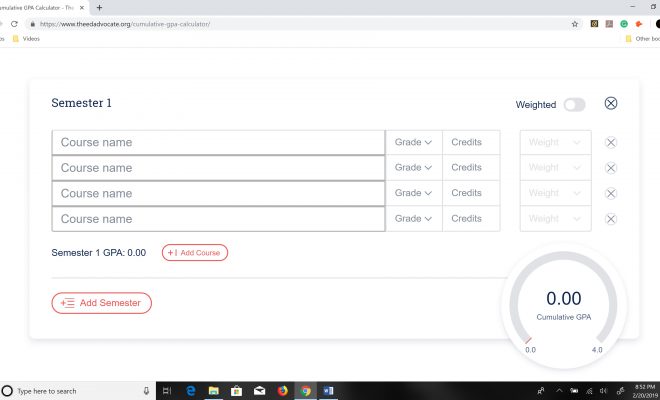How to Calculate Your High School GPA, College GPA, and Cumulative GPA

What is GPA?
Your GPA (Grade Point Average) is a figure that represents all the letter grades you earned in either college or high school. Abridging the letter grades on your transcript into one score provides colleges and businesses with a quick overview of your academic acumen and helps you stay on top of your educational goals.
Gratefully, our GPA calculator calculates your GPA for you, but the calculations aren’t sorcery. Keep reading to figure out how your GPA is tabulated and find out the subtle differences between college and high school (weighted or unweighted) GPAs. Before we continue, we would like to thank Exam-Labs for sponsoring this article.
GPA Scales
GPA tabulation begins by changing your letter grade into a number. In the traditional 4.0 scale, each grade is assigned a number from 0-4:
- A = 4.0
- B = 3.0
- C = 2.0
- D = 1.0
- F = 0.0
The GPA scale isn’t uniform and varies from school to school. For example, some school districts use a 0-5 or 0-4.5 weighted scale to give more points for honors or AP classes. We’ll show you how to tabulate a weighted GPA later on, but for now, we want to make sure you find the specific scale your school uses to convert letter grades into scores.
Most schools also use “+” and “-” and letter grades, and this is often shown in the grading scale by adding or subtracting 0.3 points. Because of this, a B+ will convert to 3.3-grade points, a B will still be 3.0 points, and a B- equals to 2.7-grade points. The only divergence is that an A and an A+ are usually both worth 4.0 points.
What ensues if your grade was submitted to you as a percentage instead of a letter grade? No problem, just use this percentage conversion chart to find the traditional translations between percentages and letter grades.
Calculating High School GPA: Weighted vs. Unweighted
Some school districts apply a weighted GPA scale to take into account more challenging classes. An “A” in AP Calculus takes more work to accomplish than an “A” in a regular high school class. A traditional weighted system adds 1 point for an AP or IB class, and 0.5 points for an honors class. An “A” in an AP class equals 5.0-grade points, and a “B” is an AP class is worth 4.0.
Let’s begin by tabulating an unweighted high school GPA using the basic 0-4 scale, and then change things up a bit with a weighted GPA calculation.
Unweighted High School GPA
GPA is tabulated by converting every letter grade to grade points and then calculating the average. Once the letter grades are converted to numbers, just add up all the grade scores and divide by the number of classes.
Total Grade Points ÷ Total Number of Classes = GPA
Here is Matthias’s report card for this semester. He enrolled 5 classes, earning 4 “A”s and 1 “B.”
| Course | Letter Grade | Grade Points |
| English | A | 4.0 |
| Algebra II | A | 4.0 |
| Phys-Ed | A | 4.0 |
| Biology | A | 4.0 |
| World History | B | 3.0 |
We begin by converting the letter grades into grade points. Because we are using an unweighted 0-4 scale, Matthias’s “A” in English converts to 4.0, while his “B” in World History is worth just 3.0.
To calculate his GPA, we have to total all of his grade points (19) and divide by the number of courses he took (5).
19 ÷ 5 = 3.8 GPA
Weighted High School GPA
Weighted GPA is tabulated sort of like unweighted GPA, except all classes are not on a 4.0 scale. AP and IB classes are historically on a 5.0 scale, and honors classes usually use a 4.5 scale, so make sure you assign the correct number of grade points. The remainder of the tabulation follows the traditional GPA formula.
Let’s take a look at a rather go-getting semester with 2 AP classes, 1 honors class, and 2 regular classes:
| Course | Letter Grade | Grade Points |
| AP English | B | 4.0 (An AP class, so a “B” is “4.0”) |
| AP Algebra | A | 5.0 (An AP class, so an “A” is “5.0”) |
| Phys-Ed | A | 4.0 (A regular class, so an “A” is “4.0”) |
| Chemistry I | B | 3.0 (A regular class, so a “B” is “3.0”) |
| Honors World History | A | 4.5 (An honors class, so an “A” is “4.5”) |
After the grade points are given based on the weighted scale, calculating the GPA is as easy as adding together all of the points (20.5) and dividing them by the number of classes (5).
20.5 ÷ 5 = 4.1 Weighted GPA
With 2 “B”s, the weighted GPA accounts for the fact that this student tackled more challenging classes. A weighted GPA makes a GPA larger than 4.0 possible. When going through applications, colleges take notice of the differences between weighted and unweighted GPAs.
Calculating College GPA
When tabulating college GPA, course credit hours are utilized. Many college courses are 3 credit hours, but challenging courses such as those in the sciences can be worth more
Like high school, the letter grade is first converted to grade points (usually according to the 4.0 scale). The grade points are then multiplied by the number of credit hours that the course is worth.
For instance, what if you took an English 101 course worth 3 credit hours and made an “A”? To calculate the number of points, just multiply the credit hours (3) by the grade points (4.0).
3 credit hours x 4.0 grade points = 12 total points
Your semester might resemble this:
| Course | Letter Grade | Grade Points | Credit Hours | Total Points |
| English 101 | A | 4.0 | 3 | 12 |
| Algebra 101 | B | 3.0 | 3 | 9 |
| Biology 101 | B | 3.0 | 4 | 12 |
| Computer Science | B | 3.0 | 4 | 12 |
| Psychology 101 | A | 4.0 | 3 | 12 |
| Total | – | – | 17 | 57 |
Did you notice how the credit hours weight the more challenging course to make them account for more points? Classes that include the added duties of a lab are usually worth more credit hours, so a “B” in Biology 101 is worth the identical number of total points as an “A” in English 101.
If you want to calculate your semester GPA, add together all the total points (57) and divide them by the number of credit hours (17).
57 ÷ 17 = 3.35 GPA
Cumulative vs. Semester GPA
A cumulative GPA calculates all the grade points you have earned across all semesters and finds your grade point average.
Let’s look at an example of 4 college semesters, with the semester GPA, credit hours and total points:
| Semester | GPA | Credit Hours | Total Points |
| Semester 1 (Fall) | 3.6 | 12 | 43.2 |
| Semester 2 (Spring) | 3.5 | 13 | 45.5 |
| Semester 3 (Fall) | 3.8 | 12 | 45.6 |
| Semester 4 (Spring) | 3.7 | 16 | 59.2 |
| Total | – | 53 | 193.5 |
We would like to find out your average GPA for all 4 semesters collectively, but you can’t just add the semester GPAs together and divide by 4. This will not provide you with an accurate average, because the credit hours per semester are not the same.
To calculate your average GPA correctly, add up the total number of points (193.5) and then divide them by the number of credit hours (53). The result is:
193.5 ÷ 53 = 3.65 Cumulative GPA
A cumulative high school GPA is tabulated similarly, all you must do is add together all of the grade points and then divide by the total number of classes.
Even better, use our cumulative GPA calculator. It handles all the calculations and also saves your current GPA so you can update it next semester!
Wrapping Up
Your GPA doesn’t make you who you are, as it is just an estimate of academic ability, which can be significantly skewed. However, it’s the best measure that we have, and it is used by colleges and companies alike to determine how seriously you applied yourself to your courses, and how responsible you were with sustaining your grades.
A high GPA is worth its weight in gold and can open doors that you never imagined.
Gratefully, it is easy to sustain or raise your GPA.
Want to calculate your GPA or grades? Try one of our trusted GPA or grade calculators.






